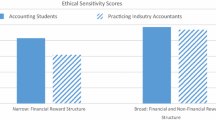Abstract
The debate on whether and how to teach business ethics in graduate business programs continues. The authors of this article suggest specific content and processes for a course aimed at giving MBA candidates the awareness, tools, and mental processes necessary to recognize and address ethical issues in decision making. The inclusion of labor law, discrimination issues, consumer protection legislation, securities laws, and an overview of the U.S. Constitution and the Bill of Rights coupled with the development of utilitarian, deontological, and egalitarian analysis of ethical issues provides the tools and processes necessary for ethical decision making. These tools and processes are applied in several class experiences using cases, moral audits, and the development of a code of ethics to help students acquire the knowledge, skills, and values needed in ethical decision making.
Similar content being viewed by others
References
Arlow, P.: 1991, ‘Personal Characteristics in College Students' Evaluations of Business Ethics and Corporate Social Responsibility’, Journal of Business Ethics 10, 63.
Beauchamp, T. L. and N. E. Bowie: 1993, Ethical Theory and Business, Fourth ed. (Prentice-Hall, Englewood Cliffs, N.J.).
Bishop, T.: 1992, ‘Integrating Business Ethics into an Undergraduate Curriculum’, Journal of Business Ethics 11, 291.
Burton, S., M. Johnston and E. Wilson: 1991, ‘An Experimental Assessment of Alternative Teaching Approaches for Introducing Business Ethics to Undergraduate Business Students’, Journal of Business Ethics 10, 507.
Corley, R. and Shedd: 1990, The Legal Environment of Business (McGraw-Hill, New York).
DeGeorge, R.: 1990, Business Ethics (Macmillan Publishing Company, New York).
Friedman, M.: 1970, ‘The Social Responsibility of Business is to Increase its Profits’, The New York Times Magazine, Sept. 30.
Furman, F.: 1990, ‘Teaching Business Ethics: Questioning the Assumptions, Seeking New Directions’, Journal of Business Ethics 9, 31.
Ghorpade, J.: 1991, ‘Ethics in MBA Programs: The Rhetoric, the Reality, and a Plan of Action’, Journal of Business Ethics 10, 891.
Magner, D.: 1989, ‘Students Urge Graduate Business Schools to Emphasize Ethical Behavior and Require Courses in Standards’, The Chronicle of Higher Education 354(29), A31.
Ostapski, S. A. and C. N. Issacs: 1992, ‘Corporate Moral Responsibility and the Moral Audit: Challenges for Refuse Relief Inc.’, Journal of Business Ethics 11, 231.
Ostapski, S. A. and D. G. Pressley: 1992, ‘Moral Audit for Diabco Corporation’, Journal of Business Ethics 11(1), 71.
Pamental, G.: 1989, ‘The Course in Business Ethics: Can it Work?’, Journal of Business Ethics 8, 547.
Schoenfeldt, L., D. McDonald and S. Youngblood: 1991, ‘The Teaching of Business Ethics: A Survey of AACSB Member Schools’ (American Assembly of Collegiate Schools of Business), Journal of Business Ethics 10, 237.
Schwartz, R., S. Kassem and D. Ludwig: 1991, ‘The Role of Business Schools in Managing the Incongruence Between Doing What is Right and Doing What it Takes to Get Ahead’, Journal of Business Ethics 10, 465.
Strong, V. K. and A. N. Hoffman: 1990, ‘There Is Relevance in the Classroom: Analysis of Present Methods of Teaching Business Ethics’, Journal of Ethics 9, 603.
Sims, R. and S. Sims: 1991, ‘Increasing Applied Business Ethics Courses in Business School Curricula’, Journal of Business Ethics 10, 211.
Author information
Authors and Affiliations
Additional information
S. Andrew Ostapski is Associate Professor of Management and Information Systems at the College of Business Administration, Valdosta State University, Valdosta, Georgia. His teaching and research interests include the legal environment, business ethics, and international business.
John E. Oliver, is presently Professor and Head of the Department of Management and Information Systems at Valdosta State University's College of Business Administration.
Gaston T. Gonzalez is an Aggregate Professor at Universidad Simon Bolivar and Visiting Professor at IESA both at Caracas, Venezuela. His teaching and research interests focus on strategic management, business transformation through information technology, and the application of system thinking to the institutionalization of ethics in organizations.
Rights and permissions
About this article
Cite this article
Ostapski, S.A., Oliver, J. & Gonzalez, G.T. The legal and ethical components of executive decision-making: A course for business managers. J Bus Ethics 15, 571–579 (1996). https://doi.org/10.1007/BF00381932
Issue Date:
DOI: https://doi.org/10.1007/BF00381932




